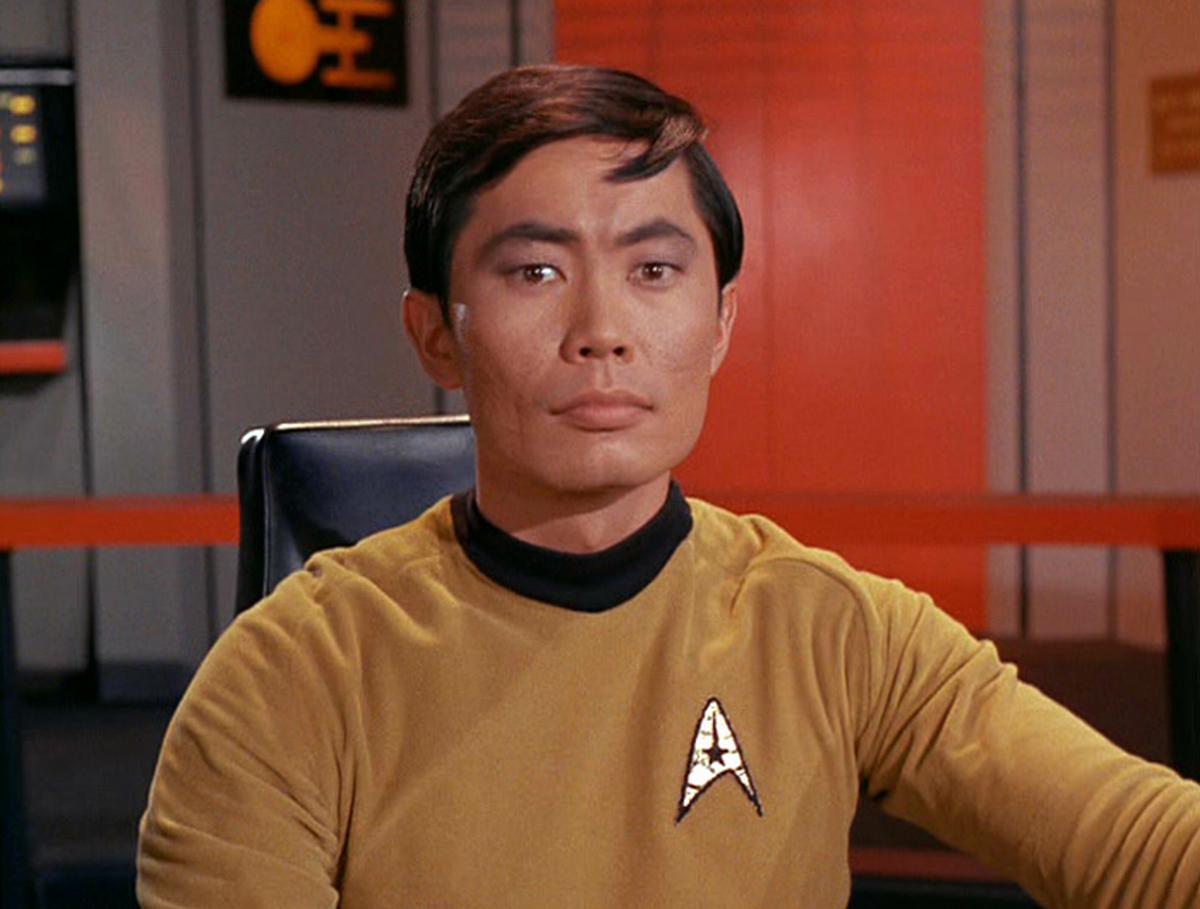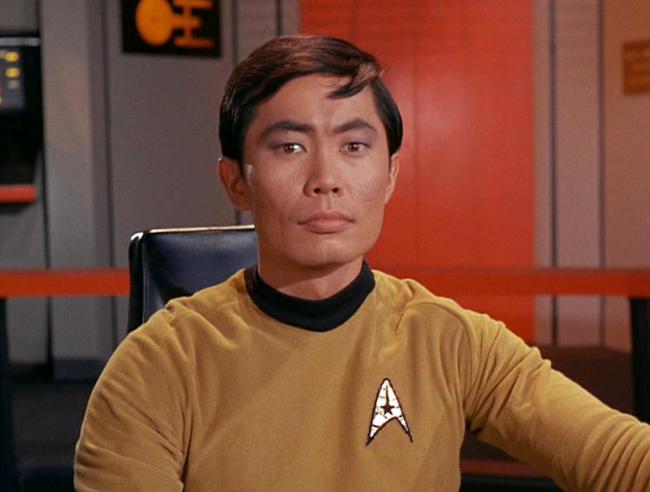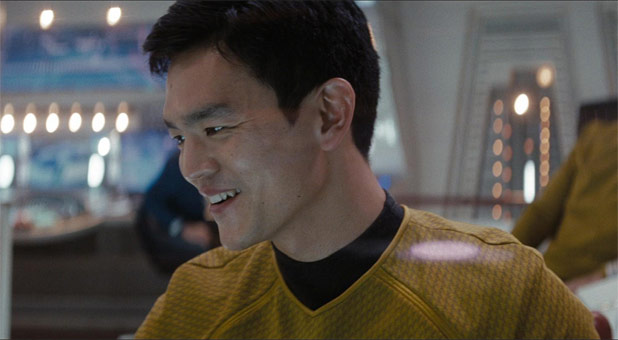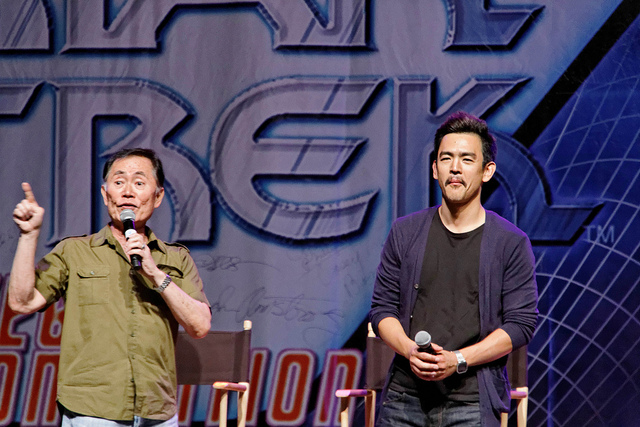George Takei Not Thrilled That Sulu Is Gay in Star Trek Beyond

It seems that although the revelation yesterday that Star Trek‘s Sulu, brought wonderfully to life by actor George Takei in the Original Series, will be gay in the upcoming Star Trek Beyond was met with joy by Trek fans gay and straight alike who were glad to see LGBTQIA representation in their favorite franchise, it was met with less enthusiasm with Takei himself. In fact, he actively voiced his opinion in opposition to this decision during the making of the film.
The Hollywood Reporter tells the story of how Takei once approached Roddenberry about making a character on Star Trek gay, but that while Roddenberry sympathized, he didn’t feel like he could risk making that decision on the show, fearing cancellation. Never mind that the show was cancelled the following season anyway.
Takei not only wishes that Star Trek Beyond had created a new gay character instead of making Sulu gay, but also that this decision is disrespectful of Gene Roddenberry, the franchise’s creator. He says, “[Roddenberry] was a strong supporter of LGBT equality. But he said he has been pushing the envelope and walking a very tight rope — and if he pushed too hard, the show would not be on the air. […] I’m delighted that there’s a gay character. Unfortunately, it’s a twisting of Gene’s creation, to which he put in so much thought. I think it’s really unfortunate.”
Takei also insists that Roddenberry specifically intended that Sulu be heterosexual.
Obviously, Takei can feel about the character he helped create however he wants, and has unique insight into Sulu. I will never know exactly what Roddenberry expressed to Takei when he was alive. However, I think there’s a huge difference between “not wanting to make the character gay” and “actively making the character straight.” Consider the following:
Sulu has expressed desire for a woman only once on The Original Series, and he was “not himself.”
In the Season 2 episode “Mirror, Mirror,” Captain Kirk, Scotty, Dr. McCoy, and Uhura end up trading places with their Mirror Universe selves, thanks to an ion storm. In the alternate universe they visit, everyone is pretty much the opposite of the way that they are in the timeline we know. And it is there that we see that Sulu lecherously hitting on Uhura. While all the other men on the show have had multiple relationships with women, of their own volition and in their own timeline, the only example of Sulu’s explicit heterosexuality is in an episode where we’re seeing an alternate universe version of the character. One in which he is thoroughly not the Sulu we’d come to know and love.
Sulu has a daughter, but one doesn’t need a relationship with a woman for that.
We know that Sulu has a daughter named Demora, who is introduced into canon in the film Star Trek: Generations. However, how Demora was conceived is only covered in a non-canon Star Trek novel by Peter David called The Captain’s Daughter. As Takei describes it to The Hollywood Reporter, “It was, to put it crudely, a one-night stand with a glamazon. A very athletic, powerful and stunningly gorgeous woman. That’s Demora’s mother.”
Now, setting aside the fact that this novel isn’t canon, there’s still the issue of it being a “one-night stand.” Now sure, Sulu may be straight and unlucky in love. Or just straight and into one-night-stands. But he could just as easily be a gay man who slept with a woman That One Time. The point is, we don’t know. We can’t know from the information we’re given.
The point is that we’re trained to see straight as the default in media. Rather than acknowledging that we don’t know the sexuality of any character until they talk about it, or until we can see enough in their actions and behavior to put together a picture, we assume straightness until proven gay. And, of course, we don’t even consider bisexuality its own thing, even when a character says they’re bisexual, because we only value that bisexuality insofar as it serves our individual agendas. If they’re dating someone of the same gender, they count as queer. If they’re dating someone of the opposite gender, then their queerness is merely lip-service.
But back to Star Trek. Again, I will never know what Gene Roddenberry actually said to Takei or anyone else with regard to the show. However, based on the show and the films, I think it’s a bit of a stretch to say that Roddenberry “had always envisioned Sulu as heterosexual.” If anything, Sulu is generally someone who seems without much sexuality at all (‘sup, Aces!).
Takei first learned about Sulu being gay in Star Trek Beyond when John Cho, who plays the character in the Kelvin Universe, told him about it a year ago. Takei expressed his disapproval then, and urged the production to create a new gay character, saying “Be imaginative and create a character who has a history of being gay, rather than Sulu, who had been straight all this time, suddenly being revealed as being closeted.” Despite the fact that these films are 1) in an alternate timeline and 2) nonetheless happen before the events of The Original Series? Making Sulu gay here would do absolutely nothing to contradict what we know of Sulu moving forward. He would never have been in the closet.
After director Justin Lin confirmed with Takei that Sulu would be gay in Star Trek Beyond:
“I said, ‘This movie is going to be coming out on the 50th anniversary of Star Trek, the 50th anniversary of paying tribute to Gene Roddenberry, the man whose vision it was carried us through half a century. Honor him and create a new character. I urged them. He left me feeling that that was going to happen,” Takei says.
After that, all was quiet from Beyond until a few months ago, when Takei received an email from [Simon] Pegg “praising me for my advocacy for the LGBT movement and for my pride in Star Trek,” he says. “And I thought to myself, ‘How wonderful! It’s a fan letter from Simon Pegg. Justin had talked to him!'” Takei was certain the creative team had rethought their decision to make Sulu gay.
Apparently that was a huge misunderstanding. Sulu remains gay in Star Trek Beyond, and Takei remains disappointed.
According to Spinoff Online, Simon Pegg, who wrote and stars in Star Trek Beyond, responded to Takei’s disapproval in The Guardian. He said, “[Takei’s] right, it is unfortunate, it’s unfortunate that the screen version of the most inclusive, tolerant universe in science fiction hasn’t featured an LGBT character until now. We could have introduced a new gay character, but he or she would have been primarily defined by their sexuality, seen as the ‘gay character,’ rather than simply for who they are, and isn’t that tokenism?”
Pegg then goes on to say that it was important to them to make Sulu gay, “because the audience have a pre-existing opinion of that character as a human being, unaffected by any prejudice.” He continues:
“Their sexual orientation is just one of many personal aspects, not the defining characteristic. Also, the audience would infer that there has been an LGBT presence in the Trek Universe from the beginning (at least in the Kelvin timeline), that a gay hero isn’t something new or strange. It’s also important to note that at no point do we suggest that our Sulu was ever closeted, why would he need to be? It’s just hasn’t come up before.”
Indeed, the powerful thing to me when I heard that Sulu would be gay in Star Trek Beyond is precisely that. That it wasn’t just some character “created to be gay” that could easily be brushed aside (or worse, become the victim of the Bury Your Gays trope). It was Sulu. It was a character that we know and have an attachment to. It’s a character we know survives and thrives in Starfleet. Do I agree that we need additional LGBTQIA characters in any and all Star Trek universes? Of course. But it doesn’t have to be either/or. It should be both.
It’s understandable that Takei, who came up in entertainment at a time when being in the closet was encouraged for self-preservation, might feel this way. Understandable that he might be concerned about what this says about gay actors in general, or about himself as an actor specifically. A big reason why actors stay in the closet, after all, is the fear that once people know that they’re gay, the concern is that audiences won’t “be able” to see them as anything else, which is death for an actor whose purpose is to be versatile and play varied characters. Just because I’m gay doesn’t mean the character has to be gay!
It’s also a bit of a downer that despite knowing about Takei’s reservations in advance, that the production went ahead and did it anyway, even if I do think it’s the right choice.
But if I could, I would urge Takei to think about how much Sulu being gay means to so many people. I would urge him to think about how meaningful it is to have an established character be gay, and to know that this character will be treated with seriousness and reverence, because he’s one of the original Enterprise crew. I would urge him to remember that new Star Trek fans are born every day, and for many, the Kelvin Universe is their intro. Regardless of what’s “canon” or not, or what Roddenberry’s specific intentions for a character may or may not have been at the time, these new films provide a chance to course-correct. To create a version of Star Trek that is truer to Roddenberry’s vision of the universe, not merely to the specifics he was bound to by corporate bosses in a bygone era.
These new films are an opportunity to provide a Star Trek that today’s generation can latch onto and see themselves in. I hope that one day Takei can feel proud that the character he helped create is in a position to be not only a touchstone for Asian fans, but for LGBTQIA fans as well.
(via io9, image of Takei and Cho via Ronald Woan/Flickr)
—The Mary Sue has a strict comment policy that forbids, but is not limited to, personal insults toward anyone, hate speech, and trolling.—
Follow The Mary Sue on Twitter, Facebook, Tumblr, Pinterest, & Google+.
Have a tip we should know? [email protected]



